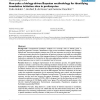Free Online Productivity Tools
i2Speak
i2Symbol
i2OCR
iTex2Img
iWeb2Print
iWeb2Shot
i2Type
iPdf2Split
iPdf2Merge
i2Bopomofo
i2Arabic
i2Style
i2Image
i2PDF
iLatex2Rtf
Sci2ools
121
click to vote
BMCBI
2007
2007
Hon-yaku: a biology-driven Bayesian methodology for identifying translation initiation sites in prokaryotes
Background: Computational prediction methods are currently used to identify genes in prokaryote genomes. However, identification of the correct translation initiation sites remains a difficult task. Accurate translation initiation sites (TISs) are important not only for the annotation of unknown proteins but also for the prediction of operons, promoters, and small non-coding RNA genes, as this typically makes use of the intergenic distance. A further problem is that most existing methods are optimized for Escherichia coli data sets; applying these methods to newly sequenced bacterial genomes may not result in an equivalent level of accuracy. Results: Based on a biological representation of the translation process, we applied Bayesian statistics to create a score function for predicting translation initiation sites. In contrast to existing programs, our combination of methods uses supervised learning to optimally use the set of known translation initiation sites. We combined the Riboso...
| Added | 08 Dec 2010 |
| Updated | 08 Dec 2010 |
| Type | Journal |
| Year | 2007 |
| Where | BMCBI |
| Authors | Yuko Makita, Michiel J. L. de Hoon, Antoine Danchin |
Comments (0)

